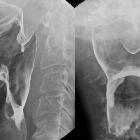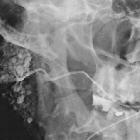Xerostomia

Xerostomie im
Röntgenbild / in der Schluckuntersuchung. Das Kontrastmittel bleibt auffallend lange an den trockenen Schleimhäuten hängen und macht dementsprechend einen kräftigen Kontrast.

Preliminary
study on the efficacy of xerostomia treatment with sialocentesis targeting thyroid disease patients given radioiodine therapy. Salivary gland scintigraphy
Xerostomia is the medical term for a dry mouth, and is most commonly due to hyposalivation.
Epidemiology
Xerostomia is the most frequently observed salivary abnormality in clinical practice .
Clinical presentation
- dryness of the mouth
- uncomfortable swallowing
- vocalisation difficulties: tongue may adhere to the palate impairing speech
- taste disturbances: ageusia and dysgeusia
- fetor oris
Complications
A chronic lack of saliva can result in several sequelae, with potentially serious morbidity:
- caries
- infections
- cheilitis
- oral candidiasis
- acute bacterial sialadenitis
Pathology
Etiology
Most people experience a dry mouth from time to time, whether related to 'nerves' or because they are mildly dehydrated.
Physiological
- anxiety
- "mouth-breathers"
- old age: reduced saliva production
Iatrogenic
- medication
- anticholinergic activity
- anticholinergics: atropine, hyoscine
- proton pump inhibitors (PPIs), e.g. omeprazole
- antidepressants, e.g. tricyclics, SSRIs
- benzodiazepines, e.g. diazepam
- opioids
- antihistamines
- agents affecting sympathetic system
- sympathomimetic agents: e.g. ephedrine
- antihypertensives
- agents promoting fluid depletion
- diuretics
- anticholinergic activity
- radiotherapy: including radioiodine for thyroid disease
- graft-versus-host disease
Disease states
- thirst due to volume depletion: commonest cause
- salivary gland pathology
- agenesis/hypoplasia of the salivary glands: rare
- psychosomatic: no objective evidence of salivary dysfunction
Treatment and prognosis
- treat underlying cause e.g. Sjögren syndrome
- artificial saliva
- optimal oral hygiene
- sialogogues
History and etymology
Xerostomia is derived from the Classical Greek, ζηρος (xeros) meaning dry, and στομα (stoma) meaning mouth .
Siehe auch:

 Assoziationen und Differentialdiagnosen zu Xerostomie:
Assoziationen und Differentialdiagnosen zu Xerostomie:


